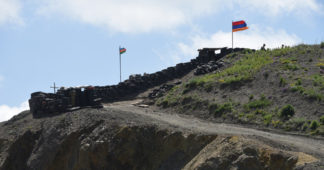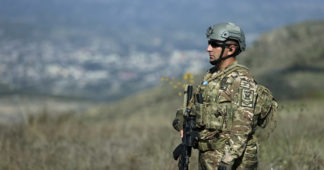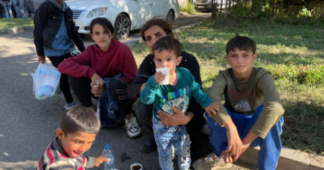Apr. 16, 2024
AMSTERDAM (Reuters) – Armenia on Tuesday urged the International Court of Justice (ICJ) to hold Azerbaijan responsible for what it said was the ethnic cleansing of Armenians from the Nagorno-Karabakh region.
“After threatening to do so for years, Azerbaijan has completed the ethnic cleansing of the region and is now systematically erasing all traces of ethnic Armenians’ presence,” Armenia’s representative, Yeghishe Kirakosyan, said on the second day of hearings at the U.N.’s top court.
The case is part of the fallout from decades of confrontation between the South Caucasus neighbours, most explosively over the disputed region in Azerbaijan.
Azerbaijan’s armed forces recaptured the mountainous region in September after years of ethnic Armenian control, prompting most ethnic Armenians to flee to Armenia.
In a case first filed at the ICJ in 2021, Armenia accused Azerbaijan of glorifying racism against Armenians, allowing hate speech against Armenians and destroying Armenian cultural sites.
Armenia said that put Azerbaijan in violation of a U.N. anti-discrimination treaty. Baku denies all the accusations against it.
On Monday, Azerbaijan told the court that most of Armenia’s complaints related to the armed conflicts over Nagorno-Karabakh and did not fall within the scope of the U.N. treaty.
It also accused Armenia of not genuinely engaging in negotiations before bringing the case to the ICJ, also known as the World Court. Kirakosyan rejected these claims.
“Armenia negotiated with Azerbaijan in good faith and pursued discussions far beyond the point of utility,” he said.
In November, the court issued emergency measures in the case, ordering Azerbaijan to allow ethnic Armenians who fled Nagorno-Karabakh to return.
Azerbaijan says it has pledged to ensure all residents’ safety and security, regardless of national or ethnic origin, and that it has not forced ethnic Armenians to leave Karabakh.
The hearings will cover only the legal objections to the jurisdiction of the ICJ and will not go into the merits of the discrimination claims. A final ruling in both cases could be years away and the ICJ has no way to enforce its rulings.
We remind our readers that publication of articles on our site does not mean that we agree with what is written. Our policy is to publish anything which we consider of interest, so as to assist our readers in forming their opinions. Sometimes we even publish articles with which we totally disagree, since we believe it is important for our readers to be informed on as wide a spectrum of views as possible.











